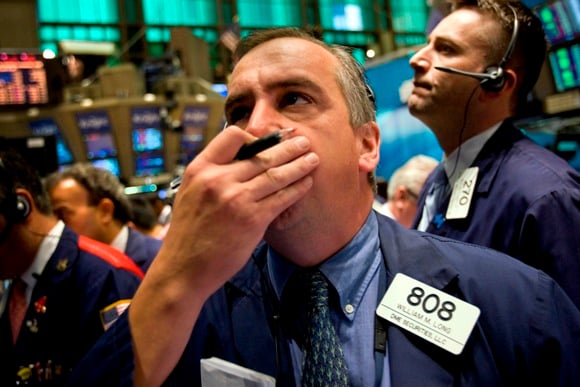Rising unemployment data and weaker-than-expected economic growth have put a dark cloud over the markets to start the day.
This morning's report from the Commerce Department, which showed that the economy is on track to grow by 1.9% this year, down from previous estimates of 2.2%, dampened pre-market enthusiasm to drive stocks down at the open.
While stock index futures suggested a positive day for the stocks, the S&P 500 was down 1% by 11 a.m. Eastern time.
“This kind of data shows everybody that the economy is slowing, and reality is setting in,” said Doug Roberts, chief investment strategist at Channel Capital Research Institute LLC, a macroeconomic research firm.
“At the beginning of the year, everything was looking up, because growth estimates were looking up and unemployment was decreasing,” he added.
The latest gross domestic product data this morning were coupled with initial employment numbers below analysts' estimates.
According to ADP Employer Services, the number of new jobs in May grew by 133,000, which was below projections of 150,000 new jobs for the month.
Mr. Roberts attributes the slowdown to a combination of an unseasonably warm spring and the flood of government stimulus efforts.
The lull in May, he said, is likely the result of front-loading jobs, and spending in March and April on typical springtime and general household projects.
“The warmer weather meant a lot of spring projects became early-spring projects,” he said. “Maybe people just started doing some of those things earlier and now they're done.”
On the slower pace of economic growth, Mr. Roberts contends that it is the result of a refusal to deal with the reality that some pain must be felt both by consumers and government.
Last year's Jobs Act, for example, encouraged capital expenditures by companies because it allowed for accelerated depreciation.
“You got a full write-off last year, and this year, you get half a write-off,” he said. “It all adds up to borrowing from future growth.”
Government stimulus efforts — in the form of the Jobs Act, stimulus programs and low interest rates — he said, have made it too easy for people to spend money but “hasn't allowed the system to get better.”
“I think the economy is in a period of massive readjustment, because consumers are leveraged and living beyond their means, and the government is still pumping money into the system,” he said. “We've only extended the stabilization process, but ultimately, there needs to be some kind of deleveraging, because you can't drink yourself sober.”
/images/newsletters src="/wp-content/uploads2012/05/twitter-bullet.png" Follow Jeff Benjamin







